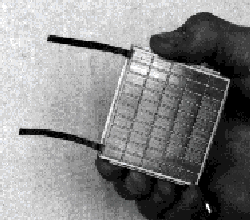 Amidst all the talk about global warming, it seems someone should be making the following simple point: Heat is just one of many forms of energy. Heat, light, magnetic force, electrical power, kinetic motion, the force of gravity... these are all types of energy. Now, i'm no physicist, but isn't the conservation of energy axiomatic, and included in the first law of thermodynamics? That is, energy cannot be created or destroyed, but only converted from one form into another.
Amidst all the talk about global warming, it seems someone should be making the following simple point: Heat is just one of many forms of energy. Heat, light, magnetic force, electrical power, kinetic motion, the force of gravity... these are all types of energy. Now, i'm no physicist, but isn't the conservation of energy axiomatic, and included in the first law of thermodynamics? That is, energy cannot be created or destroyed, but only converted from one form into another.
So, consider this: To speak of global warming is to say we are developing an excess amount of heat on our planet, which is to say we are accumulating a surplus of that particular type of energy. Stated in this way, the crisis can be seen as a potential for great advancement. The law of conservation of energy would seem to give unequivocal assurance that the excess heat could be converted into, say, electrical energy. This would solve two problems at once: it would provide a means of absorbing the excess climatic heat energy, and at the same time relieve our dependence upon fossil fuels and nuclear fuels in generating electricity. All that is required to realize this are the engineering details, which i will discuss further below.
 The daffy California legislature may ban incandescent light bulbs if they want, and they may even believe that they are doing something worthwhile. But from all the data that i've seen (e.g. these three links), the lion's share of electrical power consumption in most American homes is refrigeration and air conditioning. Make those processes more efficient, and you've really done something significant.
The daffy California legislature may ban incandescent light bulbs if they want, and they may even believe that they are doing something worthwhile. But from all the data that i've seen (e.g. these three links), the lion's share of electrical power consumption in most American homes is refrigeration and air conditioning. Make those processes more efficient, and you've really done something significant.
Now, refrigerators, freezers, and air conditioners all employ a mechanical system of absorbing heat from one place (the inside of the refrigerator or the inside of the house), and pumping that heat elsewhere (to the outside of the refrigerator or house). The design specifics may vary, but that's the basic process. The heat energy is not destroyed, only moved from one place to another. In fact, the operation of the mechanics consumes electrical energy and dissipates that energy in the form of heat, resulting in a net loss of electrical energy and an equivalent net gain of heat energy:
Heat + electrical power -> Heat (transported) + more heat
Well, what if a system could be built which transformed heat energy at relatively low temperatures into electrical energy, thus reversing the net effect of the above:
Heat -> Electrical power
Think of the ramifications. Instead of consuming electrical power, every refrigerator, freezer, and air conditioner would become a source of energy, putting electrical power back into the grid to be used for other purposes. If done correctly, the entire power grid might even become self-sustaining, needing no outside fuel sources such as coal or nuclear material.
I may as well fantasize further, and say that, with all this nearly free energy, we could then start building massive refrigeration units to convert all our extra global warmth into electrical or other forms of energy. Perhaps the excess electrical energy could be used in electrolysis plants to create hydrogen fuel as a stockpile of stored power for future use, eventually rendering all energy problems obsolete.
 Well, as it turns out, there are already ways to convert heat into electricity. The conventional power plant uses heat to generate steam, which drives a turbine generator. This requires intense and massive heat, though, which does not answer the challenge. But new technologies are being developed which may work at lower temperatures. Right now, you can buy thermoelectric modules to produce small amounts of electricity, and soon you may be able to procure thermal diodes to do the same. Other new research uses thermoelectric modules made from cheaper organic materials, making them potentially more affordable and practical. Still other work has demonstrated the creation of electricity from candles, and even from tap water.
Well, as it turns out, there are already ways to convert heat into electricity. The conventional power plant uses heat to generate steam, which drives a turbine generator. This requires intense and massive heat, though, which does not answer the challenge. But new technologies are being developed which may work at lower temperatures. Right now, you can buy thermoelectric modules to produce small amounts of electricity, and soon you may be able to procure thermal diodes to do the same. Other new research uses thermoelectric modules made from cheaper organic materials, making them potentially more affordable and practical. Still other work has demonstrated the creation of electricity from candles, and even from tap water.
So far, these methods are not practical for an efficient redesigning of refrigeration or air conditioning applications. But some of these technologies may be improved, or other techniques may yet emerge which will fit the criteria and produce the revolutionary results discussed above. All that's missing are the engineering details. And, even as i write this, i'm sure that some brilliant young physicist or engineer will soon come along, and tackle those details. Probably he's in grad school right now, or perhaps high school, grade school, or still in diapers.
 That is, unless he hasn't been aborted. But even at that, surely another one will come along. Just so that one isn't aborted as well. Which brings me to the heart of my proposed solution:
That is, unless he hasn't been aborted. But even at that, surely another one will come along. Just so that one isn't aborted as well. Which brings me to the heart of my proposed solution:
We must come to recognize that people are the greatest resource this world has. I know the myth of overpopulation is a strong one. But it is also a statistically indefensible one; we haven't neared that threshold yet. To think that there is anything to be gained by the agenda of contraception and abortion is to throw the baby out with the bathwater, literally. Human creativity and human genius and human toil and human love are what will solve the problem of global warming, and every other global challenge which we may face. A niggardly fear of babies is counter-productive as well as hateful.
So, in order to insure that the brilliant young engineer does indeed come forward, we need to immediately reverse Roe v. Wade, and impose a strict moratorium on further abortions, regardless of the circumstances. Our global future depends upon it.





No comments:
Post a Comment